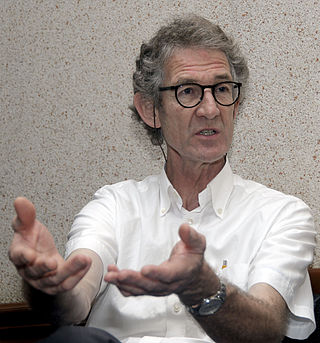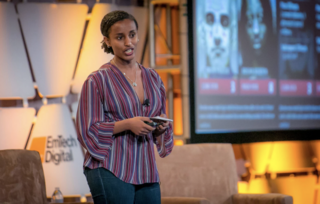Related Research Articles

The Massachusetts Institute of Technology (MIT) is a private land-grant research university in Cambridge,Massachusetts. Established in 1861,MIT has played a significant role in the development of many areas of modern technology and science.

Science and technology studies (STS) or science,technology,and society is an interdisciplinary field that examines the creation,development,and consequences of science and technology in their historical,cultural,and social contexts.

Wiebe E. Bijker is a Dutch professor Emeritus,former chair of the Department of Social Science and Technology at Maastricht University in the Netherlands.

Nancy Hopkins,an American molecular biologist,is the Amgen,Inc. Professor of Biology at the Massachusetts Institute of Technology. She is a member of the National Academy of Sciences,the Institute of Medicine of the National Academy,and the American Academy of Arts and Sciences. She is known for her research identifying genes required for zebrafish development,and for her earlier research on gene expression in the bacterial virus,lambda,and on mouse RNA tumor viruses. She is also known for her work promoting equality of opportunity for women scientists in academia.

Manuela Maria Veloso is the Head of J.P. Morgan AI Research &Herbert A. Simon University Professor in the School of Computer Science at Carnegie Mellon University,where she was previously Head of the Machine Learning Department. She served as president of Association for the Advancement of Artificial Intelligence (AAAI) until 2014,and the co-founder and a Past President of the RoboCup Federation. She is a fellow of AAAI,Institute of Electrical and Electronics Engineers (IEEE),American Association for the Advancement of Science (AAAS),and Association for Computing Machinery (ACM). She is an international expert in artificial intelligence and robotics.

Inez Fung is a professor of atmospheric science at the University of California,Berkeley,jointly appointed in the Department of Earth and Planetary Science and the Department of Environmental Science,Policy and Management. She is also the co-director of the Berkeley Institute of the Environment.

Suzanne Doris Berger is an American political scientist. She is the Raphael Dorman and Helen Starbuck Professor of Political Science at the Massachusetts Institute of Technology (MIT) and director of the MIT International Science and Technology Initiative. A leading authority in comparative politics and political economy,she has pointed to the centrality of politics in mediating and redirecting ostensibly transcendent forces,such as economic modernization and globalization.

The MIT Center for International Studies (CIS) is an academic research center at the Massachusetts Institute of Technology. It sponsors work focusing on international relations,security studies,international migration,human rights and justice,political economy and technology policy. The center was founded in 1951.

Kathleen M. Carley is an American computational social scientist specializing in dynamic network analysis. She is a professor in the School of Computer Science in the Carnegie Mellon Institute for Software Research at Carnegie Mellon University and also holds appointments in the Tepper School of Business,the Heinz College,the Department of Engineering and Public Policy,and the Department of Social and Decision Sciences.
Engineering studies is an interdisciplinary branch of social sciences and humanities devoted to the study of engineers and their activities,often considered a part of science and technology studies (STS),and intersecting with and drawing from engineering education research. Studying engineers refers among other to the history and the sociology of their profession,its institutionalization and organization,the social composition and structure of the population of engineers,their training,their trajectory,etc. A subfield is for instance Women in engineering. Studying engineering refers to the study of engineering activities and practices,their knowledge and ontologies,their role into the society,their engagement.
Radhika Nagpal is an Indian-American computer scientist and researcher in the fields of self-organising computer systems,biologically-inspired robotics,and biological multi-agent systems. She is the Augustine Professor in Engineering in the Departments of Mechanical and Aerospace Engineering and Computer Science at Princeton University. Formerly,she was the Fred Kavli Professor of Computer Science at Harvard University and the Harvard School of Engineering and Applied Sciences. In 2017,Nagpal co-founded a robotics company under the name of Root Robotics. This educational company works to create many different opportunities for those unable to code to learn how.
Jessica Hammer is an assistant professor in the Human-Computer Interaction Institute at Carnegie Mellon University.
Tamara Ann Broderick is an American computer scientist at the Massachusetts Institute of Technology. She works on machine learning and Bayesian inference.

Rediet Abebe is an Ethiopian computer scientist working in algorithms and artificial intelligence. She is an Assistant Professor of Computer Science at the University of California,Berkeley. Previously,she was a Junior Fellow at the Harvard Society of Fellows.
Lotte Franziska Bailyn is an American social psychologist. She is the T Wilson Professor of Management,Emerita at the MIT Sloan School of Management. She was the first woman faculty member at MIT Sloan.

Melissa Nobles is an American political scientist and academic administrator. She is currently Chancellor and Professor of Political Science at the Massachusetts Institute of Technology in Cambridge,Massachusetts. She previously served as the Kenan Sahin Dean of the MIT School of Humanities,Arts,and Social Sciences and Arthur and Ruth Sloan Professor of Political Science.
Robert Y. Shapiro is an American political scientist specializing in public opinion polling and statistical methods. He is the Wallace S. Sayre professor of government at Columbia University. He is the chair of the Roper Center for Public Opinion Research at Cornell University,president of the Academy of Political Science,editor of the Political Science Quarterly,and a former acting director of the Institute for Social and Economic Research and Policy at Columbia.
References
- 1 2 3 "Fotini Christia | People | MIT Political Science". polisci.mit.edu. Retrieved 2023-01-03.
- 1 2 "Fotini Christia named director of the Sociotechnical Systems Research Center | News | MIT Political Science". polisci.mit.edu. Retrieved 2023-01-03.
- 1 2 "Studying conflict from the ground up". MIT News | Massachusetts Institute of Technology. 4 March 2015. Retrieved 2023-01-03.
- ↑ Levenson, Michael (2011-05-09). "Harvard connection plays in Canadian's loss". Boston.com. Retrieved 2023-01-03.
- ↑ "Racial equity and data science | News | MIT Political Science". polisci.mit.edu. Retrieved 2023-01-03.
- ↑ "Political scientist Fotini Christia receives Andrew Carnegie Fellowship". MIT News | Massachusetts Institute of Technology. 23 April 2015. Retrieved 2023-01-03.